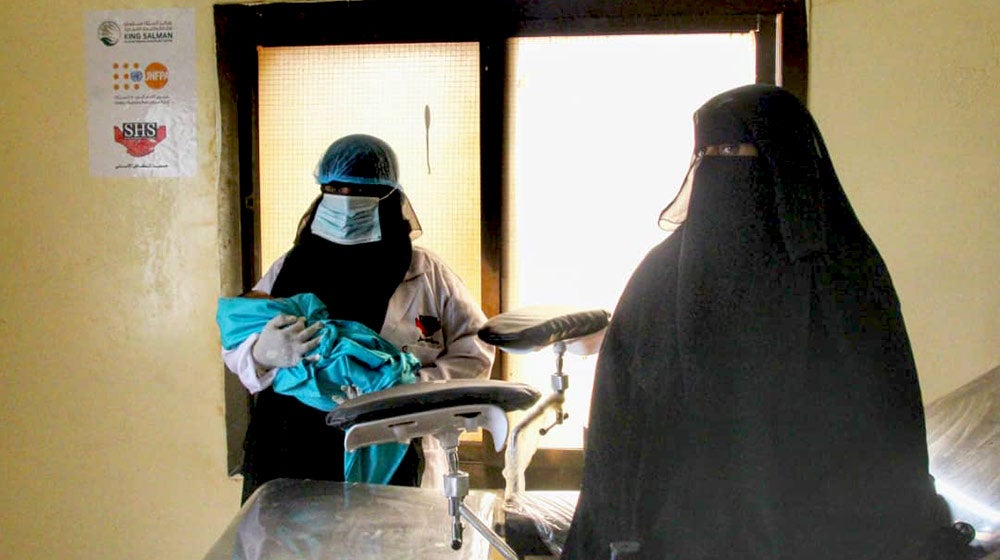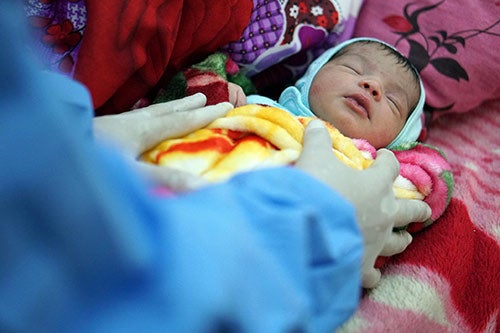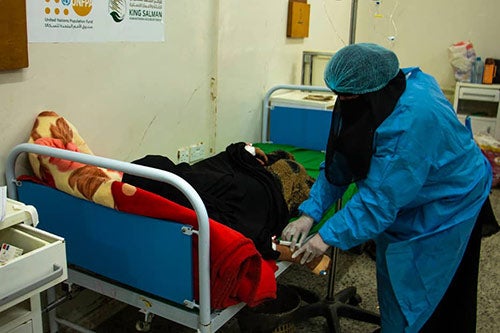
SANA’A, Yemen – In mid-May, just as the COVID-19 pandemic arrived in Yemen. But, funding for UNFPA’s life-saving reproductive health services dried up. Lack of funds forced UNFPA to suspend reproductive health care in 140 out of 180 health facilities.
The consequences have been catastrophic, particularly for pregnant women and girls. Health workers around the country recounted heart-breaking instances of preventable maternal deaths taking place after care became unavailable.
Since then, with new but limited funds, UNFPA has been able to resume operations in some key health facilities. These centers saved women’s lives immediately.
Lives saved
Al-Shael Health Center was able to resume reproductive health services in July. The European Union Civil Protection and Humanitarian Aid stepped up after this services closed earlier in the year.

The reopening saved Eltaf’s life. She had been ready give birth at home, but she began to bleeding heavily.
“When Eltaf arrived at the Al-Shael Health Center, she was in a critical condition,” said Dr. Eshraq, the gynaecologist at the health centre.
Even though the center resumed reproductive health services, larger hospitals treated serious cases. “Yet there was no time,” Dr. Eshraq explained. “I was afraid that she and her baby would die.”
They were able to stop the hemorrhaging. “Then we helped to deliver her baby, who was suffering from asphyxia,” she said.
“It is like a miracle that we saved Eltaf and her baby with the resources we have. I am proud of my team: midwife Huda and nurse Raya.”
Safe birth in Yemen
In Socotra, with funding from the King Salman Humanitarian Aid and Relief Center, UNFPA has been able to support reproductive health services at two health facilities.
One is the Nawjad Health Center, which was non-functional last year. Women on the island were without any reproductive health services. When Noor, now 20, experienced complications in her pregnancy, she traveled hundreds of miles to give birth at a health facility. By the time she arrived, it was too late. She lost the baby.
This year, she became pregnant again. But this time, she was able to deliver at a clinic under the care of a midwife, free of charge. She had a healthy baby boy.
“I am happy to come to this health center. If it was not here, we would have to make the long journey again to the city,” Noor’s husband said. “It would have cost me 60,000 Yemen Riyal.”
“This health centre was abandoned for a long time. We did not receive any pregnant women,” said centre’s director. “But these days, it has become a lifeline for many women in Socotra.”

Funds still scraping bottom
Despite these recent re-openings, some 70 per cent of UNFPA’s reproductive health programs in the country remain closed due to the lack of funding. Only 61 out of 180 UNFPA-supported reproductive health facilities are functioning.
By this time last year, UNFPA had supported 265 health facilities and 3,800 reproductive health workers. The agency had reached over 2 million women and girls with reproductive health services. Today, an estimated 1.5 million women of childbearing age are no longer receiving reproductive health services because of the funding shortage.
Yet the need for this care has never been greater.
UNFPA estimates that approximately 6 million women and girls of childbearing age in Yemen need access to reproductive health care. More than a million pregnant women are malnourished. Meanwhile, the COVID-19 pandemic is overwhelming the country’s health system, escalating the vulnerabilities of women and girls.
To keep reaching the most vulnerable women and girls through the end of the year, UNFPA urgently requires $38.7 million. An additional $20 million would allow UNFPA to respond to the COVID-19 pandemic in Yemen.
UNFPA.org originally published a version of this story.